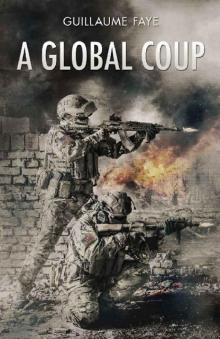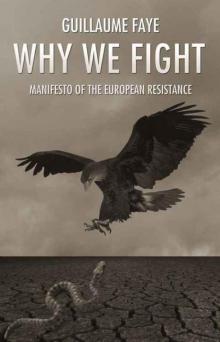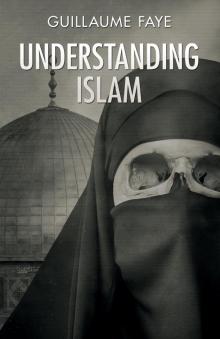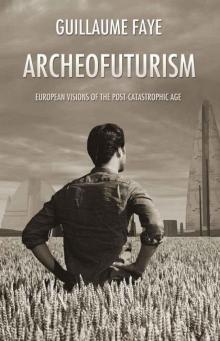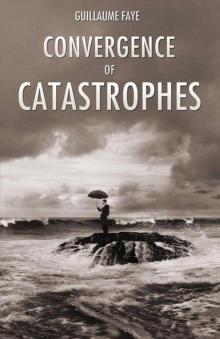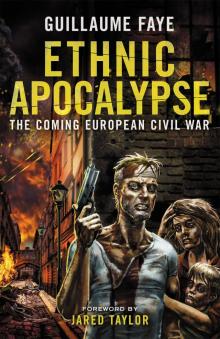A Global Coup, page 33




We can predict and are already witnessing the emergence of numerous counter-powers against our own. The peoples who experience our domination enter into a state of resistance, considering us to be their enemies. […] Wanting to build such an empire is problematic, because it subverts public liberties in the US and thwarts the will of foreign peoples. An imperial strategy will only be a threat to America, which will involve itself in unnecessary and unprofitable wars; it will weaken us as a nation, overburden our finances, bleed our economy, and lead our army and federal budget to breaking point.
McConnell adds: ‘We are now more isolated from mankind’s general perception than we have ever been in our entire history’. He compares America’s current situation to that of the British Empire as assessed by Edmund Burke at the start of the 19th century. According to Burke, Britain’s unrivalled power was rooted in a contradiction that was unmanageable in the medium term: the emergence of global opposition to the Empire itself and the ever-increasing costs of various imperial institutions which Albion could no longer bear. The fate of the Ottoman Empire could be also mentioned in this respect.
On his part, Charles Kupchan writes the following words in that manifesto:
The administration’s central mistake is its central assumption, this gamble that has already proven to be crumbling from within, this belief that the stronger America is, the more uncontested its governance, and the more the rest of the world will follow it willingly, with submission. […] The United States of today is far less secure than it was a few years ago, because we have undermined the international architecture that helped to protect us.
***
This determined yet frantic opposition to imperial temptation could be explained through the following intuition: although it actually lacks the means to do so, the NAI seems to be desperately attempting to conduct a global coup in an effort to exorcise the new planetary landscape emerging from the 21st century, especially when one considers China’s irrepressible rise. On its part, the USA appears to be striving (in what would be a very unwise calculation on its part) to take advantage of the historical vacuum that stretches from the collapse of the USSR to the heralded emergence of China and its becoming a superpower, in order to impose itself once and for all and perpetuate its status of the ‘world’s sole superpower’. Once again, one cannot help noticing the recurrent American mental desire to bring about the ‘end of history’ and suspend the latter’s flow. The NAI’s imperial ideology thus becomes a fantastical means of enabling the USA to temporarily prolong its extraordinary monopoly over global power, which it appropriated after the fall of the USSR.
From a Machiavellian perspective, therefore, it is in the interest of China, India, Russia and Islam to have America drown in its imperial hubris, a situation that is bound to destabilise it, subject it to hatred and lay it to waste. How upset they all would have been at the sight of a smiling, empathetic and unpresumptuous America, an America that would be ‘nationalistic’, yet non-imperial, having carefully cultivated its domestic power, stabilised its finances, protected its borders against the Latino-Asian invasion and developed an impenetrably tranquil sort of power, an America that would favour cultural, technological and monetary influence over fatigued brutality and free itself from its poisonous commitment to Israel’s unconditional protection. Such a standpoint, espoused by American ‘conservatives’, would certainly have enabled the great American republic to endure for a long time to come, not in the position of the world’s ‘sole superpower’, which is but a drunkard’s dream (right, Mr. Bush?), but as a very strong world power leading a secure existence. There is but one US President, undoubtedly one of the best to have been elected, who could have devised such a policy: Richard Nixon.
***
In Patrick Buchanan’s eyes, ‘the end of the imperial project’ is at hand (WorldNetDaily, 15/10/2003). This project will not have lasted very long: concocted by the neoconservatives right after the collapse of the USSR, it was compromised by the neocons themselves and nipped in the bud, so to speak, as soon as the latter seized power and attempted to implement it, mistaking themselves for Roman centurions. There is, however, a level on which American leaders will prove to be the most dangerous of all: their obstinacy and refusal to acknowledge obvious defeat. All the better: acting as a creator of disorder, America has proceeded to spin the wheel of History instead of stopping it at the winning number.
***
An even more virulent criticism of the imperial fantasies embraced by the Bush doctrine has been formulated by political scientist Charley Reese and entitled Road to Darkness (King Features Syndicate, 29/09/2003). Reese is both an American patriot burdened with disappointment and hurt and a Democrat ideologist. His conviction is that the US government’s arrogance is destroying America’s global image. He manifests a certain desire for repentance in relation to American imperialism, displaying a very ‘anti-Vietnam war’ attitude. Reese has close ties to senator Edward Kennedy, whose words he corroborates: ‘Bush has involved us in this war through fraud’. He also mentions the pretext regarding the alleged ‘weapons of mass destruction’, predicting that the Iraqi (ad)venture will turn out to be worse than that of Vietnam. In contrast with Rumsfeld’s theories, he expands on the idea that Washington (or the neoconservative administration, at least) longs to imitate the Europe of yesteryear, and particularly England, in a ridiculous remake of ancient British colonialism. Driven half-mad, the neoconservatives mistake themselves for ancient Englishmen, at a time when the English have, in turn, chosen to yield to American order.
Reese writes:
Bush is only looking to gain a foothold in Iraq for economic reasons, in order to control the country’s reconstruction. The myth regarding the reinstatement of a ‘democracy’ has not fooled anyone. Washington is simply trying to impose a puppet government. Unfortunately, Americans are not able to pay the price for this in spilled blood and spent dollars. […] Our dream of empire is grotesque. Our President wants a relentless war against the rest of the world. His fantasy of imitating Emperors will turn out to be simultaneously ruinous for America and, paradoxically, fatal to the latter’s very power.
In this regard, Reese’s analysis highlights the fact that the mechanism that could transform the American republic into a global empire is a passport to the realm of demise. In France, his views were adopted by Emmanuel Todd (as seen in After the Empire). He states:
We Americans are not programmed for the construction of an empire. When those Arab terrorists struck against the WTC twins, the FBI and CIA suddenly discovered that, unfortunately for them, they were part of the category of people who do not understand a single word of Arabic, even though the USA had been involved in Middle-Eastern affairs for more than a century. I even met a general entrusted with selecting the nuclear targets of our American armed forces and, during the conversation, he mentioned Iran, classifying it as an “Arab country”, unaware of the fact that it was not.
From Reese’s perspective, this utter ignorance of other peoples and civilisations, characterising both the Americans and their leaders, robs them of any and all prospects of building an empire and overseeing world order. He reproaches his country for its provincialism, a provincialism that is incompatible with any universalistic ambitions. This is because one must first be familiar with others and be able to understand them if one is to aspire to dominate them. Reese adds:
Our soldiers are scattered across 120 countries around the world. The indebtedness that stems from our military-industrial complex is above our means. We have a President who advocates a war without end, one that our country will not be able to survive. We are heading towards bankruptcy. If our President aspires to become an emperor, let him re-read Roman history. No emperor, nor even his people, has ever reaped the benefits of his own greed. I pray for the Americans to awaken and re-establish the republic of our Founding Fathers, as well as a military strategy founded on armed neutrality, leaving the quagmires of overseas intervention behind. To choose the path of empire is to sink into darkness.
Annexes (Part IV)
Examples of Counterproductive Americanophobia
The Neo-Leftist and Islamophilic Right
The most refined and most caricatural examples of Americanophobic delirium do not come from Leftist or Islamist milieus, whose members are all too cunning to allow it, but from a certain intellectualistic Parisian Right that has become Islamophilic, plagiarising pro-immigration and alter-worldist topics in a vain effort to make the world forget its past. Here are some examples.
Serious analyses and arguments against American imperialism have been replaced with romanticism and low-rate pamphleteering invectives, with exclamation marks and capital letters everywhere, as seen in Alain de Benoist’s following text (in La ligne de mire16 , published by Le Labyrinthe):
In France, the wave of Terror left 42,000 fatal casualties in its wake, with the Indian genocide claiming 10 million lives [how did he get such figures, I wonder?] Hail the Algonquin! Hail Little Tortoise, chief of the Miami Indians! Hail Chief Joseph, the one with the pierced nose! […] Hail Black Cauldron, the Cheyenne Indian! Hail Mad Horse! Hail Red Cloud! Hail Sitting Bull! The question is now whether we want to end up like these Indians.
In other words, we Europeans are at risk of being targeted with genocide and slaughtered by the Americans. We are Indians in the making. Pursuing his high-standard analysis, de Benoist charges on:
Let them take back their golden boys and yuppies! Their cheerleaders and pom-pom girls! Their think-tanks and multinationals!17 Their 5 million obese citizens! Their “moral majority” and junkies! Their cowboys, sheriffs and saloons!
And so on, and so forth. The counterproductivity of such tantrums is obvious.
Rightfully deploring Europe’s Americanisation and our continent’s subservience to American imperialism, the above-mentioned author does not call for an Identitarian and ‘European’ Europe, but for ‘a Europe that is open to all cultures and not the prisoner of a single one’ (in La Ligne de Mire, page 102). In other words, we are to support a cosmopolitan and Third-World Europe against an American one, but definitely not an ethnocentric European continent: that would be ‘racist’, you see.
Those who embrace OHAA have created such a forced portrait of America that their approach discredits them:
There is undoubtedly no country whose mentality is so profoundly marked by a hysterical element. America is the land of major collective psychoses. It is a country where one faints of fear in the cinema while watching horror films. (Taken from the same source.)
And what about the Shiite flagellants? Are they not hysterical too?
Mirroring the symptoms of obsessive and hysterical anti-Americanist Islamophilia, the same author makes the following remark in his personal diary (Dernière Année18 , l’Age d’Homme editions, p. 54):
Two young Muslim girls were expelled from a certain college in Flers for wanting to wear their scarf in the classroom. One symbol for another, then: I personally feel that it would be more adequate to expel the girls who wear jeans.
These words, which no Imam would ever be stupid enough to utter, are the fanatical terms of a future Muslim convert. To prohibit girls from wearing jeans (and mini-skirts as well, perhaps?): this is the level to which our intellectual Parisian anti-Americans and their programme have stooped… This generally common fury against the wearing of jeans, this negative attitude towards a pair of trousers that have long since gone out of fashion, relates to a neurosis that has yet to be explained.
The ‘New’ Right only regards its anti-Americanism as a means of minimising (which basically means glorifying) the Islamisation of Europe, as demonstrated by the following delirious comments made by Robert de Herte (in Éléments, April 2003, number 2):
So as to justify its own actions and legitimise its chokehold, the USA has invented a new scarecrow with the potential to seduce the feeble-minded: the Islamic-Arabian-Muslim-terrorist one. It thus exploits this Islamophobic delirium, which one now encounters everywhere, using it to its own advantage.
Simply put, the Islamisation of Europe is actually a film, a virtual invention by the Great American Satan. As for terrorism, it is but a dream. And the connection between Islamism and terrorism is sheer fantasy, as is, of course, the over-delinquency characterising immigrants. Intellectualism meets cretinism…
What we obviously need to draw attention to, within the OHAA camp, are the ‘French-Iraqi friendships’ and the role played by the movement’s inimitable secretary general Gilles Munier, who has declared himself to be both a ‘Gaullist’ and a ’stout supporter of the Baath party’, proclaiming in Le Journal du Dimanche (30/03/2003):
I can understand perfectly well why some Iraqis would choose to wage war against America on its own territory.
His words entail the very same implicit and irresponsible call for terrorism that one encounters among his neo-Leftist friends.
This is because hysterical anti-Americanism goes hand in hand with militant Islamophilia and Arabophilia, both of which feature very prominently in the prevailing ideology’s vulgate. In his biography of German philosopher (?) Sigrid Hunke, a pseudo-‘pagan’ and Islamolatrist who authored a delirious book entitled Allah’s Sun over the Occident (1960), the inevitable Alain de Benoist reiterates the same old song:
In this book, Sigrid Hunke has highlighted the things that the European civilisation owes the Arab one, particularly in the fields of science, mathematics, medicine and philosophy. […] Outweighing the influence of the Antiquity itself, it is essentially Arab science [sic] that enabled a genuine scientific rebirth by liberating the European spirit from the theological Christian mentality during the 12th century. (Éléments, November 1999.)
He then goes on to mention a dozen ‘scientists’ whose names have been Arabized, including the unavoidable Averroes. He somehow forgets to point out, in the process, that none of them were actually Arabian and that every single one of them was condemned by Islam for heresy. Expressing admiration, de Benoist also stresses ‘the ancientness of the relations binding the Arab world to the European one’. The word ‘relations’, of course, could easily have been replaced with ‘wars’ or ‘sanguinary confrontations’. In short, this great, self-taught scholar and brownnose attempts to make us aware of the fact that we allegedly owe the Arabs more than we do the Greeks.
The denial of the Muslim threat against Europe is an equally recurrent topic:
Faced with the Muslim “invasion” supposedly taking place in today’s France, the catholic Right is most willing to allude to the memory of Charles Martel. (Éléments, February 1999, p. 30.)
‘Charles Martel’, you say? You mean that odious Islamophobe and the first head boasted by the French hydra, right?
***
Another symptom that typifies intellocratic delirium and its disconnection from reality lies in the fact that the ‘enemy’ of our European civilisation is never specific, nor is he ever visible. The evidence that points to our continent’s colonisation at the hands of Islam and the Third World is denied simply because it is all too blinding and excessively simple (and especially too dangerous to mention in the eyes of these slipper-wearing rebels), having been replaced by the following jargonising abstraction:
It is the global domination system centred around the market-technology-show triptych that remains our principal foe. […] Michel Marmin highlights the manner in which Hollywood has colonised our imagination [Is the Star Academy a Hollywood product, then?] and, having drafted the astonishing chronology of the European submission to the diktats of American cinematographic industrials, he proceeded to designate the real true current threat: the self-Americanisation of French cinema. (A debriefing of a GRECE colloquium published in Éléments, February 1999.)
If it were the case that the principal threat to Europe lay in the ‘Americanisation of our cinema’ and not in our demographic decline and the ethnic invasion that we are being subjected to, I, for one, would truly be reassured.
***
When reading the ‘Manifesto of the New Right’ written by A. de Benoist and C. Champetier, one is quick to realise that this ideological confusion is the result of a desire to be admitted into the neo-Leftist sphere. The manifesto teaches us that ‘liberalism is our foremost enemy’. Such extremism, however, discredits any and every critique of liberalism, which these authors, amateur economists that they are, systematically confuse with mercantilism, as well as materialism.
The New Right does not perceive immigration to be of any danger and chooses to support the coexistence of various ethnic communities in Europe. Here is an example of the jargon used by these utopians, whose views are tainted by the values of 1968:
No apartheid, and no melting-pot; the solution can only be found in the acceptance of others in their otherness, from a perspective of mutual dialogical enrichment.
Ignoring all the evidence, these people regard immigration as the ‘forced uprooting’ of victims who, to use terms that have been borrowed from the Trotskyite-Marxist vulgate, are none other than the unfortunate immigrants themselves, having been ‘reduced to the level of relocatable merchandise’ […] and ‘compelled to abandon their native country to live in another, where they are welcomed as the auxiliaries of our economic needs’. In other words, there is no such thing as illegals and fake refugees that overrun us. In the eyes of the authors, immigrants are all being involuntarily deported…
The authors have thus removed their ‘Identitarian’ disguise and spoken in favour of Europe’s organised Third-Worldisation, chastely labelled ‘the communitarian model’:

